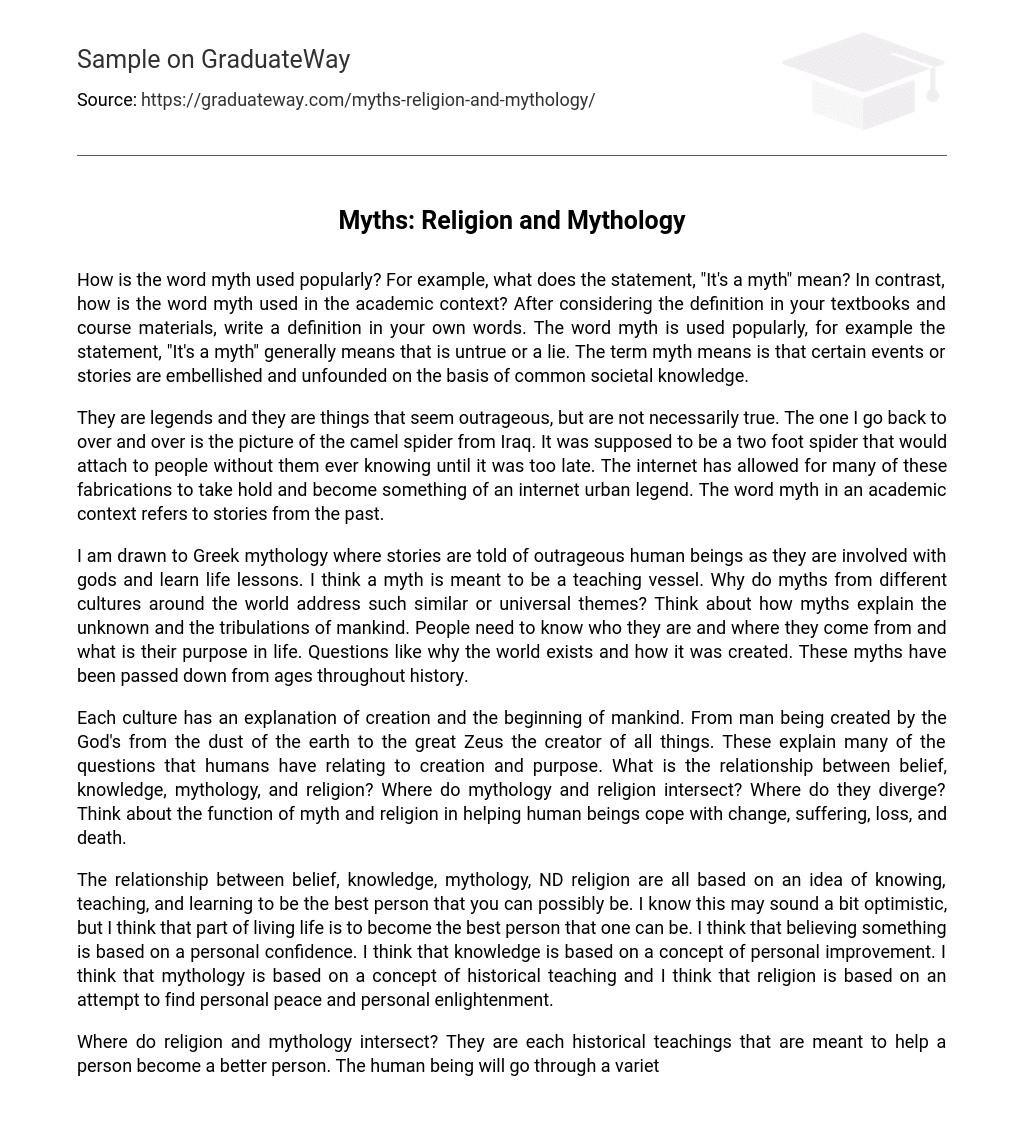How is the term myth commonly used? For instance, what does the expression “It’s a myth” signify? Conversely, how is the term myth employed in an academic setting? After deliberating on the definition found in your course materials and textbooks, compose your own interpretation. The popular usage of the word myth, such as the phrase “It’s a myth,” typically denotes something that is false or deceptive. When utilized academically, the term myth signifies that specific events or narratives are exaggerated and lacking a foundation in widely accepted societal knowledge.
They are legends and things that may seem outrageous but are not necessarily true. The one I repeatedly revisit is the depiction of the camel spider from Iraq. It was believed to be a giant spider measuring two feet in length that would silently attach itself to unsuspecting individuals until it was too late. Thanks to the internet, many of these falsehoods have gained traction and evolved into internet urban legends. In an academic context, the term myth pertains to historical stories.
Greek mythology is captivating because it recounts the interactions between extraordinary humans and gods, resulting in the acquisition of wisdom. These myths serve as a means of imparting valuable lessons, prompting curiosity about why myths across various cultures frequently explore comparable or universal themes. Such tales shed light on mysteries surrounding the unknown and the obstacles confronted by humanity, addressing essential questions pertaining to identity, origins, and life’s meaning. Passed down through generations, these ancient myths chronicle the history of our world.
Beliefs about the origins of humans and the world vary across cultures, encompassing explanations such as gods molding humans from earth’s dust and Zeus being recognized as the creator. These diverse beliefs seek to address human inquiries regarding creation and purpose. The relationship between belief, knowledge, mythology, and religion is intricately intertwined. Mythology and religion intersect in certain aspects while diverging in others. It is important to recognize how myth and religion function as tools for individuals to navigate change, endure suffering, cope with loss, and confront mortality.
The interconnectedness of belief, knowledge, mythology, and religion lies in the pursuit of reaching one’s fullest potential through knowing, teaching, and learning. Despite its optimistic nature, I firmly hold the belief that striving for self-improvement is crucial in life. Belief is built upon personal confidence while knowledge stems from the journey towards personal growth. Mythology instructs us about our history and religion guides us towards inner peace and enlightenment.
Religion and mythology both aim to assist individuals in personal growth and development. They offer historical teachings to guide individuals towards self-improvement. Throughout a person’s lifetime, they will experience various cycles, including managing change, enduring suffering and loss, confronting death, and encountering happiness. The purpose of these teachings is to help individuals navigate through these transformations. In what ways can the relevance of mythology be justified in today’s society? Consider the significance of familial and cultural traditions.
The arts and advertising often utilize mythology to symbolize human experience and provide guidance for navigating life’s challenges. Mythology can be viewed as a valuable tool for helping individuals cope with the difficulties that arise in daily life. It is important to defend and embrace myths, as they offer invaluable assistance in navigating the hardships of existence. Additionally, by considering the significance of familial and cultural traditions, one gains insight into the historical context that shapes human perspective.
They allow us to see how much society has changed and how much people have remained the same in regards to their conflicts and problems. Typifying the human experience is an example. Who could say that our society is not filled with mythology as it is? I believe that it is entirely. Movies, books, stories, and visual images all serve as contemporary mythology. Who is to say that future societies won’t reflect on our current culture and perceive our movies and books in the same way we view myths and cave art? It’s intriguing to contemplate.





